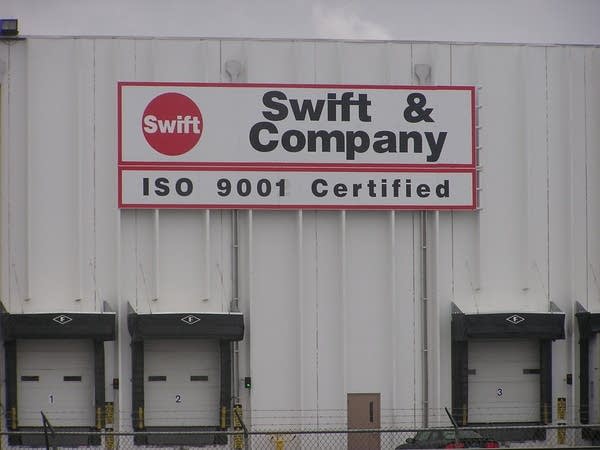Preparing a "Day without Immigrants"
Go Deeper.
Create an account or log in to save stories.
Like this?
Thanks for liking this story! We have added it to a list of your favorite stories.

The main focus of the event in Minnesota will be an afternoon rally at Powderhorn Park in Minneapolis. No one knows how many people will actually boycott work, but the impact of the event has already been felt.
The nation's meatpackers will close some two dozen plants around the U.S. today in part because they're concerned they won't have enough workers.
The outpouring of public action by immigrants this year caught most people by surprise. Rallies expected to draw thousands of people instead attracted tens, or even hundreds of thousands. Some 30,000 people turned out in St. Paul for a rally.
We as an organization did not have to push anyone into doing this. It was a movement that started from the people.
So it's probably not surprising that Jesus Torres avoids making any predictions about "A day without immigrants."
Turn Up Your Support
MPR News helps you turn down the noise and build shared understanding. Turn up your support for this public resource and keep trusted journalism accessible to all.
"I wish I could give you a number but it would be really, really hard to do that," says Torres. "From what I have heard and seen, a lot of people are going to do it. And after May 1 we can be able to say something about that."
Torres works at Centro Campesino in Owatonna, an organization that works for better immmigrant working and living conditions. He says this year's protests have developed almost spontaneously.
"We as an organization did not have to push anyone into doing this," says Torres. "It was a movement that started from the people, and now everyone in every small town knows what is happening and they are taking all these different actions, depending on their capacity to do that."
Organizations that oppose immigration are also trying to gain more public attention for their views. Several groups calling for stricter immigration laws rallied in Minneapolis over the weekend -- and about 75 people showed up in the rain.
Ruthie Hendrycks is founder of Minnesotans Seeking Immigration Reform. Hendrycks is troubled by what she sees as an unwillingness on the part of immigrants to respect U.S. laws and culture.
"We have pushed the issue of our language, which is English. They are flamboyantly broadcasting and stating they are not going to speak English, and that they are going to speak Spanish. If this continues in this way, where is it going to stop?" Hendrycks asks.
Hendrycks also claims illegal immigrants who don't pay taxes, but use government resources, are hurting the nation's economy.

The point of the "Day without immigrants" is to try to prove exactly the opposite -- that the U.S. economy is dependent on work performed by immigrants.
In Minnesota, the immigrant work force is heavily concentrated in the hospitality and agriculture industries.
Meatpacking is dominated by immigrants. Officials at Colorado-based Swift and Co. say minorities make up anywhere from 60 to 90 percent of the work force at its various U.S. packing plants.
In Minnesota, minorities account for about 80 percent of the more than 2,000 employees at Swift's pork processing operation in Worthington.
Swift's Sean McHugh says the company will close the Worthington plant and five others on May 1, in part because of uncertainties raised by "A day without immigrants."
"It was safe to say, both through sort of formal and informal communications with employees or employee representatives, that there was a high level of interest for many of our employees at many sites across the country to participate in these events," says McHugh.
Swift and several other major meatpackers support a guest worker program. They believe that would allow enough legal immigrants into the country to meet their workforce needs.
Donald Stull from the University of Kansas has studied the meatpacking industry for 20 years. He says the meatpacker's decision to close plants sends several messages.
One goes to Congress, saying immigrants are important to the U.S. economy.
Another is aimed at meatpacking workers. Stull says worker-management relations are often strained at meatpacking plants because of the tough, often dangerous work. "This was an opportunity, I think, for them to demonstrate that they do care about their workers, that those workers are important to them and that they value them in some way," says Stull.
That type of public acknowledgment came most strongly from Minnesota-based Cargill. Company officials said they would close seven meatpacking plants, in part because they "share the concerns of employees" over immigration legislation.
That concern has been building for years. Jesus Torres of Centro Campesino in Owatonna says whether participation for "A day without immigrants" is low or high, the push for change will continue.
"This is not going to be the only day that an action like this is going to happen," says Torres. "Because people are really going to have a sense of, 'If I did it this day I'm going to be able to do it the next day.' As long as it takes in order to get the respect that they deserve as human beings."
He says immigrants have a growing sense of political power. That, he says, is the most important result so far of the growing immigration rights movement.





